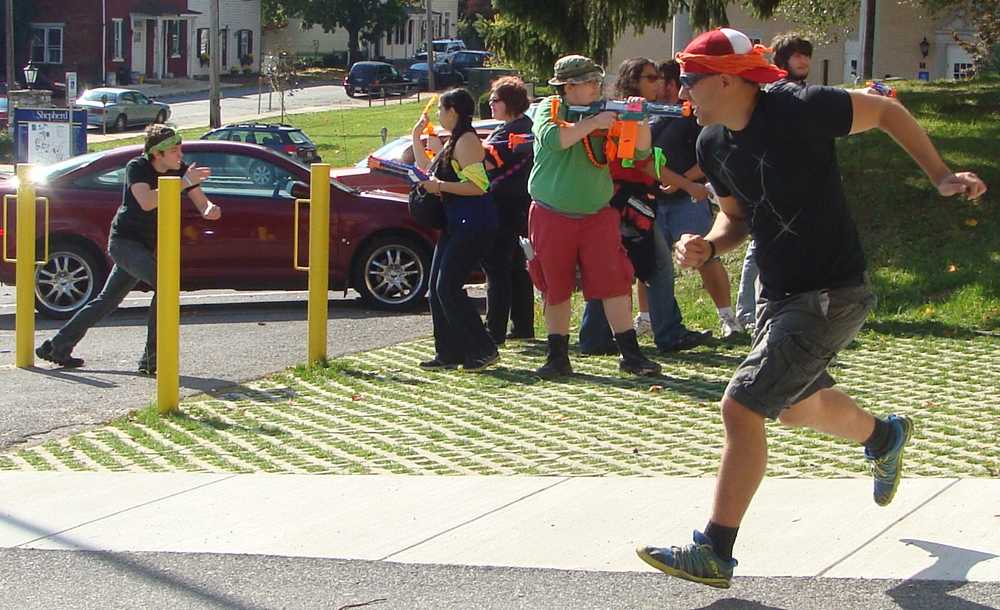Nerf Blasters and bandanas took over the midway last Thursday as Shepherd University’s student organization Humans Versus Zombies infected campus during fall break.
“Think of it like cops and robbers,” said Orion Kimberlin, Human Versus Zombies (HvZ) officer.
HvZ is a mission-based apocalypse simulation organization. It is a campus-wide event in which players must complete various missions while protecting members of an assigned group and simultaneously fighting the replicated undead.
Prior to gameplay, officers briefed the group on rules and regulations. Mike Mccahey stated that players should avoid hitting cars with blasters, idling in the streets, and they should be mindful of those not playing.
According to Rachael Meads,the director of Program Board “this year’s HvZ planning team has done a fantastic job of organizing the game, working with police and the campus administration to make sure everyone is in the loop and in agreement.
Depending on the group size, a certain number of players were assigned as zombies and the rest were flagged as humans. The band of humans must then complete a series of campus-wide tasks while being pursued by the undead. Once a human is tagged, he or she then becomes infected.
Jennifer Predmore, a sculpting major, made it as one of the final four humans left alive on Thursday. It was her first time playing. “The Nerf crossbow is my favorite weapon. I’m getting good at it,” she said. Jennifer stated that of the missions, delivering the food boxes across campus to the arts center was the most difficult, and she was surprised she was able to do it.
This year is HvZ’s second year as an official Shepherd organization. Prior to that, it was stopped due to safety complaints by staff. Orion stated that this year they are still working out some kinks to make things more organized, but they have a lot of high hopes.
“Instead of having games during the week, we are going to do two weekend events during the fall semester and one weekend event in the spring semester,” Kimberlin said. The second event held in the fall will be in mid to late November.
Before HvZ got shutdown, the group had over 150 members. The turnout on Oct. 17 drew a crowd of about 35 students.
Each event has new missions and every storyline is different, according to previous members. Though there were several new members, Kimberlin confirmed some alumni do come back to play. “There will actually be an alumni coordinator for the spring semester,” he said.
The original idea of HvZ was started by Goucher College located in Baltimore, Md. in 2005. It was a phenomenon that spread via the Internet, and Shepherd has been trying to uphold the tradition for about eight years. According to the official HvZ website, more than 650 colleges and universities take part in the staged scenario.
HvZ also plans to eventually evolve into an active gaming club in the future, in order to add in activities such as snowboarding, paintball and ultimate frisbee.
While Kimberlin said that HvZ is as close as simulating the apocalypse on campus as possible, there was no question of where the best place on campus to stake out in the event of a real outbreak. “On top of the Scarborough Library because it is a roof top, has a good vantage point and the dining hall is close.”

